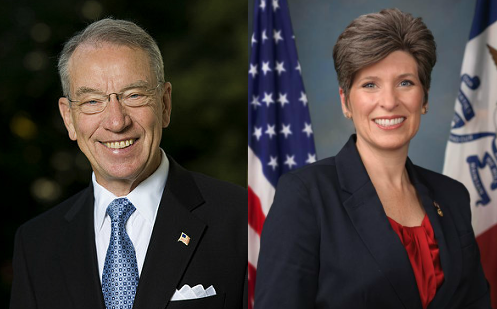For the second year in a row, Iowa’s U.S. Senators Chuck Grassley and Joni Ernst voted to advance a budget plan that would require massive cuts to most federal government programs in the coming decade. Senator Rand Paul’s plan was so extreme that only 22 Senate Republicans–less than half the GOP caucus–supported the motion to proceed with considering the legislation.
By not drawing attention to the June 3 vote, Iowa’s senators successfully kept the story out of the news in their home state.
It was another example of a phenomenon Bleeding Heartland has flagged before: if our members of Congress don’t brag about it in a press release or a conference call with reporters, Iowa newspaper readers and television viewers are unlikely ever to learn that it happened.
David Lerman reported for Roll Call,
Paul’s plan would require cutting all programs except Social Security by 2 percent a year from fiscal 2019 levels for the next five years. Spending would then be allowed to grow at an annual 2 percent rate for the following five years, according to a summary statement.
In fiscal 2020, the plan would require $183.1 billion in spending cuts, a level of austerity that could bring the appropriations process to a halt because of bipartisan objections. By contrast, congressional leaders already have begun negotiations to raise discretionary spending limits for the coming fiscal year to avoid having to cut about $125 billion from current spending levels to comply with limits imposed under a 2011 deficit reduction law.
Over 10 years, Paul’s plan would require cutting $11.3 trillion from projected spending levels, his office estimated. But it said the plan would still allow for spending to grow by 18.2 percent from current levels over the decade.
Paul claims his plan would balance the federal budget in five years. He hasn’t always been truthful about the impact of similar plans, and his math skills are lacking. Bobby Kogan, the chief mathematician for the Senate Budget Committee, tweeted last week that Paul’s “budgets are, without fail, the most poorly constructed I’ve ever analyzed.” Kogan identified many problems in this year’s model, from typos to double-counting and errors of addition or subtraction.
Although the proposed reductions appear small–just 2 percent a year, Paul claims–they would lead to deep cuts over the next decade. Spending on programs other than Social Security would drop by 51 percent.
What would that mean? Paul’s budget implies:
-a $3.4 trillion cut to Medicare, ripping health insurance from 39 million people
-a $1.9 trillion cut to Medicaid, ripping health insurance from 40 million people
-a $223 billion cut to SNAP, taking food away from 16 million people— Bobby Kogan (@BBKogan) May 30, 2019
“And that’s in the scenario where I generously assume he’s cutting the military and veterans funding in half, the same as everything else,” Kogan added. “If he protects them, the cuts for everything else get much, much deeper.”
So it’s not surprising that just 22 Senate Republicans voted for the latest attempt to move the Kentucky senator’s budget forward.
Hundreds of thousands of Iowans would be affected by cuts to Medicare, Medicaid, or food assistance, and thousands more would feel the loss if the federal government greatly reduced discretionary spending, such as U.S. Department of Agriculture subsidies for farmers or rural development programs. Yet I found no report about yesterday’s Senate vote on any Iowa news website. Staff for Ernst and Grassley haven’t mentioned it in this week’s news releases (see here and here).
Neither Grassley nor Ernst called attention to their May 2018 vote to proceed with considering Paul’s last budget plan, which would have forced comparable cuts. Just 21 Senate Republicans supported that motion. The only Iowa media reference I found was a column by Adam Sullivan for the Cedar Rapids Gazette. He approvingly noted that Iowa’s senators backed Paul’s effort, in contrast to other Republicans who “don’t really mean it” when they promise to balance the budget.
Grassley and Ernst voted against the budget amendment Paul offered in January 2017. Only fourteen members of the GOP caucus supported that plan.
It’s been eight years since any Iowa-based news organization had a correspondent in Washington. Our U.S. House and Senate incumbents benefit from this state of affairs. Understaffed newsrooms can’t closely follow what happens at the Capitol and are unlikely to write up Congressional stories not offered to them.
The latest Democrat to enter the 2020 Senate race, Theresa Greenfield, tweeted on June 3 that Ernst “should explain why she voted today with Rand Paul & far right DC Republicans for a budget that threatens devastating cuts to Medicare, Medicaid, public schools, critical ag programs & crucial veterans funding.”
Whether the fourth estate will hold her accountable for that vote is an open question.

